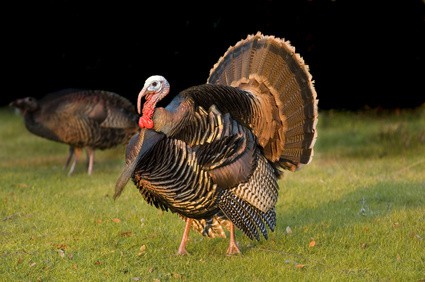If you’re hunting turkey the best way to entice a gobbler into your crosshairs is withan awesome range of turkey calls.
However, if your turkey calling isn’t up to scratch you’re going to struggle to even glimpse one. Let alone shoot one.
That’s why I’m going to show you where you’re going wrong by giving you some of my best turkey calling tips.
Call Confidently
Many hunters make the mistake of being too quiet with their turkey calls. They’re worried that they’ll scare turkeys off if they’re too loud.
But this couldn’t be further from the truth.
Sure, turkeys have vind meer info soft, gentle calls some of the time, but this is usually only when other turkeys are visible.
A lonely turkey, meanwhile, is more likely to let our loud calls to alert gobblers from some distance.
That’s why you need to really project your call.
You’ll want to start off gently just to test the waters because, you never know, there could be a huge gobbler just behind that bush.
If there’s no sign after about 5 minutes then gradually start increasing the volume and number of calls.

You Need to Sound Natural
If there’s a big tip you need when calling a turkey it’s that you have to sound natural.
A turkey’s vocabulary is very complex and packed full of variations in tone and pitch which you must mimic to attract them.
If you find yourself making turkey calls which are too slow or too fast then it’s going to ring alarm bells in the gobbler’s head.
Likewise, a strutting Tom may sound confident one minute and less sure the next. They certainly won’t be acting aggressively non-stop, so your calls need to be very realistic.
If you want any chance of successfully calling a turkey then you need to brush up on all the variations and idiosyncrasies which make up their vocabulary.
Try to Sound like an Entire Flock
At the start of the day you have no idea what the nearby gobblers are looking for, so don’t just call out like an isolated hen.
Instead, use a mixture of mouth and friction calls to simulate a whole flock of turkeys from strutting toms to lonely hens and gobblers spoiling for a fight.
You can then establish which call your gobbler is responding to the most and then concentrate your efforts on this call.
Not Every Turkey Can Be Called
You see that gobbler surrounded by hens every single week? Part of the reason he’s so successful is that he’s clever.
And he doesn’t fall for turkey calls made by humans.
Gobblers like this present an exciting challenge for hunters, but remember he doesn’t fall for man-made turkey calls.
In fact, you’re making him more cautious with your constant calling, so, for once, drop the calls.
Reassess your hunting strategy and work on an ambush instead. He may be clever, but you should always be MORE clever.
You Can Call with Your Hands Too
A great turkey calling tip is that you don’t have to rely on just your vocal cords, but many hunters don’t realize that your hands are an important tool too.
If a gobbler’s close by you can grab their attention by scratching at leaves with both hands. With a little bit of practice you can make it sound as though there are two hens scratching about.
And what gobbler can resist that?!
Not Practicing Enough
Say you’re going on vacation to France. You wouldn’t expect to just pick the language up straight away would you?
No, you’d watch videos, learn about the vocalizations and maybe even get a tutor.
And turkey calling is no different. It’s a whole new language and the best way to learn is by going direct to the source and studying turkeys.
Watch how they interact and, if possible, take a recording device and take plenty of notes.
This gives you plenty of prep time away from the field to work on your turkey calling skills.
Knowing when to Stop Calling

Sometimes the best option is to go silent when hunting turkeys.
It may be that the gobbler has got so close that you need a sudden dose of silence to protect your position and give him time to see your decoy set up, to get him just a little closer for the perfect shot.
And other times you may not be 100% sure of the best call for the best scenario, so don’t risk scaring turkeys off with the inappropriate call. Just bide your time until you understand the situation.
I hope these tips help you improve your turkey calling, so please let me know what you thought in the comments below!

Leave a Reply